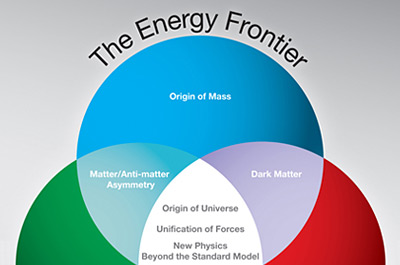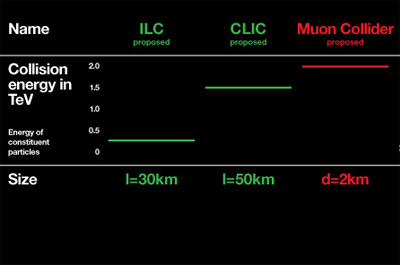

Why Muons at the Energy Frontier?
Muons are the heavy cousins of electrons. They have the same electric charge and interact with matter in a similar way: muons and electrons belong to the same family of particles known as leptons. Unlike protons, which comprise subatomic particles called quarks, muons and electrons come in one piece: they are elementary particles.
Muons could eliminate a big problem that scientists face when accelerating electrons: in a circular accelerator, electrons emit light and lose energy as they go around the ring. This puts a limit on the maximum energy that the electrons can reach in such a machine. The solution could be a straight accelerator, in which electrons don’t emit light. But scientists would need to build a very long (and hence expensive) linear accelerator to propel electrons to record energies.
Because muons are 200 times heavier than electrons, they emit less light and lose less energy when traveling in a circle than electrons do. Hence scientists are developing the concept of a circular muon accelerator. Sending the muons through the same loop and the same accelerating cavities repeatedly reduces the number of cavities needed and the footprint necessary to accommodate a collider. The machine would easily fit on the Fermilab site.
Experiments done using a muon collider would complement experiments at the Large Hadron Collider at the European laboratory CERN. The LHC accelerates protons and makes them collide at record energies. Scientists expect that the collisions will reveal the nature of dark matter, extra dimensions of space and the origin of mass.
Once the LHC experiments reveal new physics phenomena, physicists could use a muon collider to make more precise studies of those discoveries. The discoveries at the LHC will determine the energy needed for a muon collider to explore these new phenomena.




